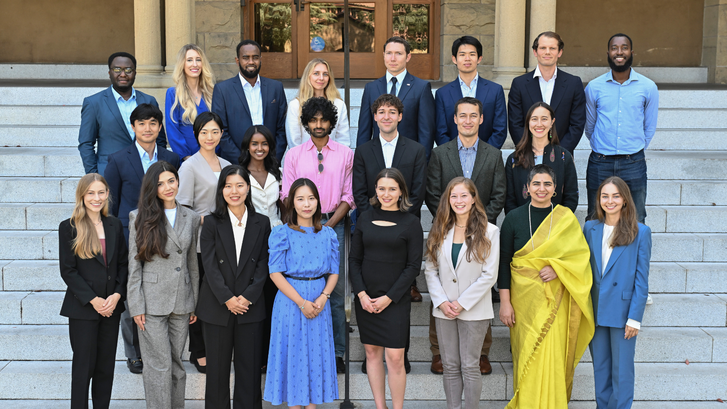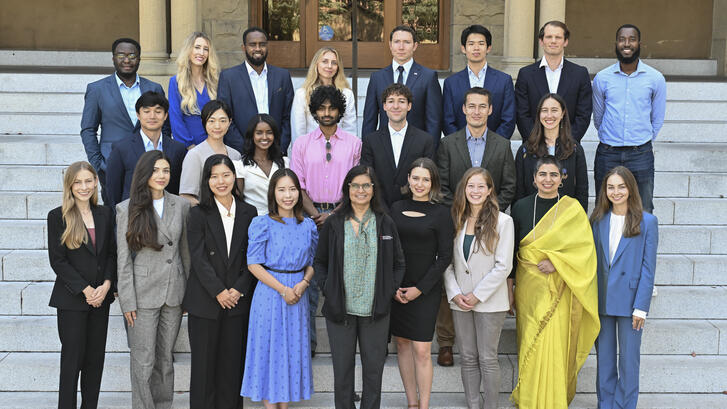Applications and Academics: Recruitment and Admissions Manager Meghan Moura Answers Questions About the Master’s in International Policy Program
Applications and Academics: Recruitment and Admissions Manager Meghan Moura Answers Questions About the Master’s in International Policy Program
The Ford Dorsey Master’s in International Policy (MIP) Program is now accepting applications for the Class of 2028. Meghan Moura answers some frequently asked questions about the admissions process and the program.

This interview has been edited and condensed.
What sets the MIP program apart from other graduate policy programs?
MM: First, we're a small community-focused program. There are fewer students per class compared to similar programs, which means we can really focus on our students and on creating a community between students, staff and faculty members. Another important distinction is that we have an interdisciplinary and flexible curriculum. Students get to explore a range of disciplines as part of their degree requirements to help them get a feel for what they're truly interested in. At MIP, we teach both hard and soft skills, and the aim is to prepare leaders who will be able to understand policy problems, design appropriate solutions to them, and then create implementation plans for these solutions. It's a well-rounded and thorough program.
We also have an interactive and innovative learning environment and we use different teaching methods — such as case studies, workshops and experiential learning — alongside more traditional lecture and seminar courses. At Stanford, we're fortunate to have leading academics and practitioners in their respective fields, and our MIP students have the opportunity to learn from them. Additionally, another aspect of our interdisciplinary curriculum is that MIP students can take classes from any of Stanford's seven schools, which is unique. Lastly, I would say that we're pretty adaptable, which is unusual. For example, we were able to add a cyber policy and security track to our curriculum when those issues became more prominent in the world of international affairs in recent years.
Can you explain more about the specializations — or tracks — within the MIP program and how they are unique?
To give a little bit of background, all MIP students complete the same core curriculum and they’re also all required to complete a capstone project. In addition to that, students have to dedicate at least 25 percent of their coursework to their chosen area of specialization. Each area of specialization includes two required courses, as well as an offering of approved electives that students can choose from based on their individual interests.
What's cool about the specializations is that they're led by a Freeman Spogli Institute for International Studies (FSI) faculty member and guided by at least one of FSI’s research centers. For instance, we have the cyber policy and security track, which is guided by the Cyber Policy Center and the Center for International Security and Cooperation. It allows students to pursue interests including disinformation, hate speech, cyber warfare, and the rise of AI. Another track is energy, natural resources and the environment, which is guided by the Program on Energy and Sustainable Development and the Center on Food Security and the Environment. It allows students to pursue their interests in climate change, food security, energy policy or natural resource-management, for example.
There’s also the specialization in governance and development, which is guided by the Center on Democracy, Development and the Rule of Law. That track is for students who are interested in things like international development, migration, governance challenges and global health. Finally, we have the international security specialization. That one is guided by the Center for International Security and Cooperation, and those students can pursue their interests in foreign policy and national security, nuclear policy, counter-terrorism and more. Our specializations allow students to pursue their interests, even if they are really, really diverse.
The average age of students in recent MIP cohorts is about 27 years old. Are younger students encouraged to apply?
On average, our students are 27 years old and they have five years of work experience. But it's important to understand that there is a range — we do have a handful of students who come straight from their undergraduate studies and have completed a couple of relevant internships. And we also have people who are 35-plus years old and who have been in the workforce for 10, 12 or 15 years.
In terms of whether someone coming straight from undergraduate should apply, what I normally say is that it's going to be a very personal decision, and the answer is going to vary from applicant to applicant. Some applicants can benefit from taking time away from school to figure out what they really want and what they're really interested in, and gaining some practical experience and skills. But others already have focused career goals, have completed internships and have a clear understanding of the skills they need to work in the fields that they want to be in. For them, it might not make sense to take time away from school — they might be ready. In general, we look for candidates who have both proven academic ability as well as relevant work experience.
For those students who are lacking a strong professional experience component, having a strong demonstrated interest in an international policy field and clear career goals can be helpful. We do a holistic review of the applications we receive, and we try to get the complete picture of each applicant. I would suggest that if you think of your lack of experience as a potential weakness, you can play on your other strengths in your application. So the answer to your question is that it varies. We do have some students who are coming straight from undergrad, but in the end, applicants have to really try to think through what will be best for them given their specific goals.
Is there an ideal MIP candidate?
That's a great question. Because we're a small program and we have those diverse areas of specialization, we have applicants and students from all over the world. They have varied interests and diverse personal, academic and professional backgrounds. What this means is that there is no single way to be a successful applicant. There isn't one model to follow. Again, we look for people who have proven academic ability and work experience. We have a somewhat older cohort, and we do place some value on work experience. But because we're both small and interdisciplinary, we’ll have somebody who comes and wants to study climate change, and someone else who wants to study counter-terrorism, and another person who wants to study global health and international development, and somehow all of these people are finding a home in the same program. So there's not one way to be successful.
But I think the key is to have a demonstrated interest in international policy, whether that is through your undergraduate career, or your internship and work experience, or the type of research that you've been pursuing, as well as having an idea of what your career goals are and being able to articulate why the MIP program is the missing component to get you from where you currently are to where you want to be.
The MIP program is not requiring the GRE this year. How will GRE scores be considered when you're reviewing applications?
We decided to waive the GRE requirement and committed to a GRE-blind review of applications this year. The rationale behind that decision is that we don't want to place the folks who aren't able to take the test at a disadvantage. We’ve been receiving questions like, “How are you making decisions if you can't see people's test scores?" And what I say is that we do thoughtful and holistic reviews of the application — in any given year, your GRE score is just one small component of all the different things that we look at. So, removing that one component doesn't mean that we're not going to be able to make informed decisions. We're not going to look at the scores because we want to be fair. Instead, applicants can submit a description of their quantitative skills and experiences in both academic and professional settings.
What kinds of funding options are available to students?
There are a number of options available to MIP students. One is the existence of the Knight-Hennessy Scholars program at Stanford, which offers full funding for graduate students across the university. Because Knight-Hennessy focuses on funding people who want to make the world a better place, their criteria is pretty nicely aligned with what students in the MIP program naturally tend to want to do. So we're lucky to have several of our students funded through the Knight-Hennessy Scholars program each year. For instance, in the latest class of 22 students, three are funded through the Knight-Hennessy Scholarship.
In addition to that, we have internal fellowships and scholarships offered either through the MIP program or through FSI. We are able to either partially or fully fund a handful of students every year, through merit-based fellowships offered to those people who we think are our top candidates.
We also have students who come with external funding. Some are funded by their branch of the U.S. military, since we have a few military students. Some have been Fulbright scholars, or Rangel and Pickering fellows. We have also had students funded by the Jack Kent Cooke scholarship or the Paul & Daisy Soros fellowship. A few of our international students are funded by the foreign ministries where they are (or will be) employed, and one is currently funded through the Joint-Japan / World Bank Graduate Scholarship Program.
Those are usually scholarships and fellowships that are secured at the time of application or admission, but then there are other mechanisms for student funding once the student is enrolled in the program. For instance, MIP provides financial support to students who pursue an unpaid internship over the summer between their first and second year of study. We also have a pretty great assistantship program within MIP that allows the program to hire a few of our second-year students to serve as teaching or research assistants for faculty members at FSI or at MIP. These assistantships are formal funding packages that include tuition allowance, a salary, and a subsidy for the university-provided health insurance plan premium.
Do you have a question that was not answered here? Reach out to Meghan at mip-admissions@stanford.edu




